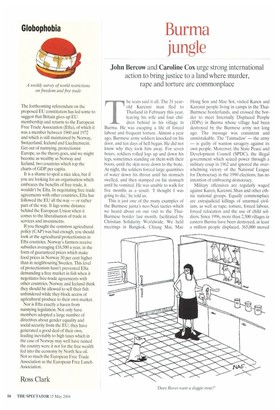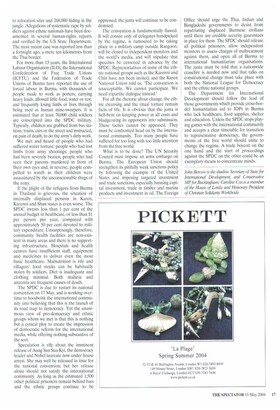Burma jungle
John Bercow and Caroline Cox urge strong international action to bring justice to a land where murder, rape and torture are commonplace The scars said it all. The 31 yearold Karenni man fled to Thailand in February this year, leaving his wife and four children behind in his village in Burma. He was escaping a life of forced labour and frequent torture. Almost a year ago, Burmese army soldiers knocked on his door, and ten days of hell began. He did not know why they took him away. For seven hours, soldiers rolled logs up and down his legs, sometimes standing on them with their boots, until the skin wore down to the bone. At night, the soldiers forced large quantities of water down his throat until his stomach swelled, and then stamped on his stomach until he vomited. He was unable to walk for five months as a result. 'I thought I was going to die,' he told us.
This is just one of the many examples of the Burmese junta's neo-Nazi tactics which we heard about on our visit to the ThaiBurmese border last month, facilitated by Christian Solidarity Worldwide. We held meetings in Bangkok, Chiang Mai, Mae Hong Son and Mae Sot, visited Karen and Karenni people living in camps in the ThaiBurmese borderlands, and crossed the border to meet Internally Displaced People (IDPs) in Burma whose village had been destroyed by the Burmese army not long ago. The message was consistent and unmistakable. The `Tatmadaw' — the army — is guilty of wanton savagery against its own people. Moreover, the State Peace and Development Council (SPDC), the illegal government which seized power through a military coup in 1962 and ignored the overwhelming victory of the National League for Democracy in the 1990 elections, has no intention of embracing democracy.
Military offensives are regularly waged against Karen, Karenni, Shan and other ethnic national groups. Equally commonplace are extrajudicial killings of unarmed civilians, as well as rape, torture, forced labour, forced relocation and the use of child soldiers. Since 1996, more than 2,500 villages in eastern Burma have been destroyed, at least a million people displaced, 365,000 moved to relocation sites and 268,000 hiding in the jungle. Allegations of systematic rape by sol diers against ethnic nationals have been doc umented in several human-rights reports and verified by the US State Department.
The most recent case was reported less than a fortnight ago, a mere ten kilometres from the Thai border.
For more than 13 years, the International Labour Organisation (ILO), the International Confederation of Free Trade Unions (ICFTU) and the Federation of Trade Unions of Burma have reported the use of forced labour in Burma, with thousands of people made to work as porters, carrying heavy loads, allowed little food, water or rest, and frequently losing limbs or lives through being used as human mine-sweepers. It is estimated that at least 70,000 child soldiers are conscripted into the SPDC military. Typically, children are grabbed from bus stations, trains, cars or the street and instructed, on pain of death, to do the army's dirty work.
We met and heard of people who had suffered water torture; people who had lost limbs from army shootings; people who had been severely beaten; people who had seen their parents murdered in front of their own eyes and, in reverse, people compelled to watch as their children were assassinated by the unconscionable thugs of the army.
If the plight of the refugees from Burma in Thailand is grievous, the situation of internally displaced persons in Karen, Karenni and Shan states is even worse. The SPDC invests less than 1 per cent of the annual budget in healthcare, or less than $1 per person per year, compared with approximately 50 per cent devoted to military expenditure. Unsurprisingly, therefore, community health facilities are non-existent in many areas and there is no supporting infrastructure. Hospitals and health centres have insufficient staff, equipment and medicines to deliver even the most basic healthcare. Malnutrition is rife and villagers' food stocks can be habitually stolen by soldiers. Diet is inadequate and clothing minimal, Both malaria and anaemia are frequent causes of death, The SPDC is due to restart its national convention on 17 May, and is working overtime to hoodwink the international community into believing that this is the launch of its road map to democracy. Yet the unanimous view of pro-democracy and ethnic groups whom we met is that this is nothing but a cynical ploy to create the impression of democratic reform for the international media, while offering nothing substantive of the sort.
Speculation is rife about the imminent release of Aung San Suu Kyi, the democracy leader and Nobel laureate now under house arrest. She may well be released in time for the national convention, but her release alone should not satisfy the international community. As long as the estimated 1,500 other political prisoners remain behind bars and the ethnic groups continue to be oppressed, the junta will continue to be condemned.
The convention is fundamentally flawed. It will consist only of delegates handpicked by the regime, is rumoured to be taking place in a military camp outside Rangoon, will be closed to independent monitors and the world's media, and will stipulate that speeches be censored in advance by the SPDC. Representatives of some of the ethnic national groups such as the Karenni and Chin have not been invited, and the Karen National Union told us, 'The convention is unacceptable. We cannot participate. We need tripartite dialogue instead.'
For all the rhetoric about change, the ethnic cleansing and the ritual torture remain facts of life. It is obvious that the junta is hell-bent on keeping power at all costs and bludgeoning its opponents into submission. These tactics cannot be appeased. They must be confronted head on by the international community. Too many people have suffered for too long with too little attention from the free world.
What is to be done? The UN Security Council must impose an arms embargo on Burma. The European Union should strengthen its pitifully weak sanctions policy by following the example of the United States and imposing targeted investment and trade sanctions, especially banning capital investment, trade in timber and marine products and investment in oil. The Foreign Office should urge the Thai, Indian and Bangladeshi governments to desist from repatriating displaced Burmese civilians until there are credible security guarantees in place for them. The SPDC should release all political prisoners, allow independent monitors to assess charges of maltreatment against them, and open all of Burma to international humanitarian organisations. The junta must be told that a nationwide ceasefire is needed now and that talks on constitutional change must take place with both the National League for Democracy and the ethnic national groups.
The Department for International Development should follow the lead of those governments which provide cross-border humanitarian aid to IDPs in Burma who lack healthcare, food supplies, shelter and education. Unless the SPDC stops playing games with the international community and accepts a clear timetable for transition to representative democracy, the governments of the free world should unite to change the regime. A trade boycott on the one hand and the start of proceedings against the SPDC on the other could be an exemplary means to concentrate minds.
John Bercow is the shadow Secretary of State for International Development and Conservative MP for Buckingham. Caroline Cox is a member of the House of Lords, and Honorary President I of Christian Solidarity Worldwide.



































































































 Previous page
Previous page